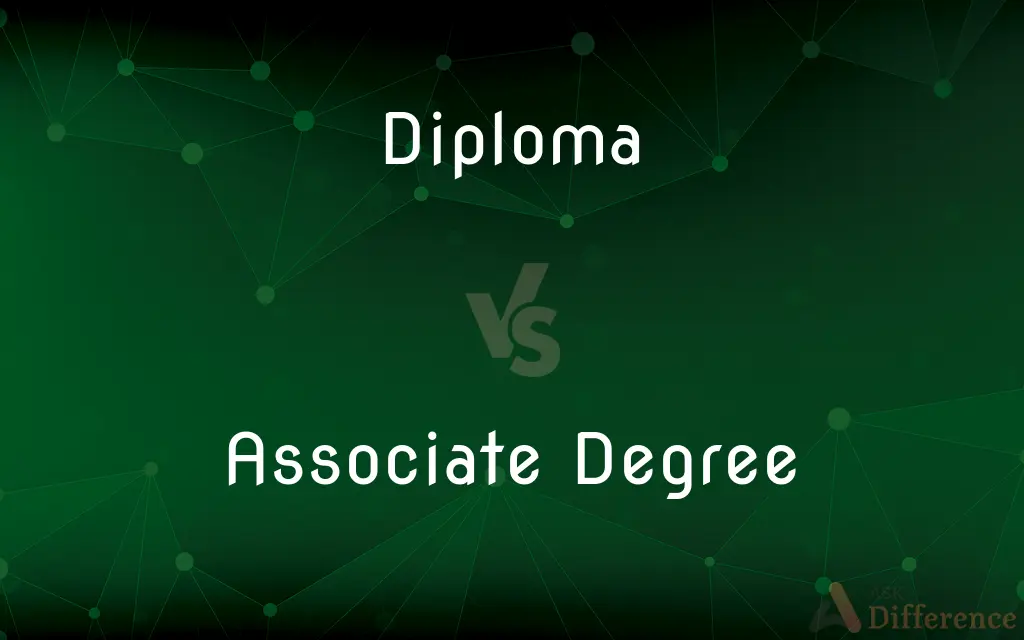Diploma vs. Associate Degree — What's the Difference?
By Fiza Rafique & Urooj Arif — Published on March 1, 2024
A diploma is a certificate awarded by educational institutions to signify completion of specific course of study, vocational or technical. Associate degree is an academic degree awarded by colleges upon completion of a course of study lasting two years.

Difference Between Diploma and Associate Degree
Table of Contents
ADVERTISEMENT
Key Differences
Diplomas are typically focused on providing practical skills and training for specific careers, such as culinary arts, automotive repair, or healthcare. These programs are designed to prepare students for immediate entry into the workforce, emphasizing hands-on experience and application of skills. Diplomas can be offered by high schools, vocational schools, and community colleges, with the duration varying from a few months to two years, depending on the field of study and the institution's requirements.
Associate degrees, on the other hand, are awarded by community colleges, junior colleges, technical colleges, and some universities, requiring about two years of full-time study. They are recognized as academic degrees that provide a broader base of education, combining general education courses with courses focused on a particular major or area of study. Associate degrees are often pursued by students intending to transfer to a four-year university to complete a bachelor's degree, as well as by those looking to enter the workforce with a higher level of qualification than a diploma.
The key difference between a diploma and an associate degree lies in the scope and purpose of the programs. Diplomas are more narrowly focused and career-oriented, while associate degrees offer a more comprehensive education that includes both general education and specialization in a particular field. This distinction affects the career paths available to graduates, with associate degrees typically opening up more opportunities for advancement and higher education.
Both diplomas and associate degrees have their advantages, depending on the individual's career goals, educational preferences, and the time and resources available for study. Diplomas can be an efficient way to gain specific skills and enter the workforce quickly, while associate degrees provide a broader educational experience with the option to pursue further higher education.
Comparison Chart
Duration
A few months to 2 years
Typically 2 years
ADVERTISEMENT
Focus
Specific vocational or technical skills
General education and specialization in a field
Offered By
High schools, vocational schools, community colleges
Community colleges, junior colleges, technical colleges
Purpose
Prepare for immediate employment
Prepare for employment or further education
Curriculum
Career-oriented, practical training
Combination of general education and major courses
Transferability
Limited to certain agreements
Often transferable to bachelor's degree programs
Career Opportunities
Entry-level positions in specific trades
Broader range of career options and advancement
Compare with Definitions
Diploma
A certification indicating completion of a specialized training program.
She earned a diploma in graphic design from a technical institute.
Associate Degree
Recognized internationally, with varying equivalency.
Her associate degree from the U.S. was evaluated as equivalent to a higher diploma abroad.
Diploma
Focused on practical, hands-on skills.
His diploma in automotive technology landed him a job at a repair shop.
Associate Degree
An academic degree awarded after a two-year course of study.
He completed an associate degree in computer science at the community college.
Diploma
May have flexible entry requirements.
The diploma course in nursing accepted applicants without a high school diploma.
Associate Degree
Offers broader career opportunities.
With his associate degree in business administration, he qualified for a management position.
Diploma
Often completed in a shorter time frame.
After a year-long diploma program, he started his culinary career.
Associate Degree
A stepping stone to a bachelor's degree.
After receiving her associate degree, she transferred to a university to pursue a bachelor's.
Diploma
Directly aligned with specific job roles.
Her diploma in dental assisting prepared her for her role at the dental office.
Associate Degree
Combines general education with specialization.
Her associate degree included courses in math, English, and biology, along with nursing.
Diploma
A document issued by an educational institution, such as a university, testifying that the recipient has earned a degree or has successfully completed a particular course of study.
Diploma
A certificate conferring a privilege or honor.
Diploma
An official document or charter.
Diploma
A document issued by an educational institution testifying that the recipient has earned a degree or has successfully completed a particular course of study.
Get a diploma
Study for a diploma
Hold a further-education diploma
Diploma
A letter or writing, usually under seal, conferring some privilege, honor, or power; a document bearing record of a degree conferred by a literary society or educational institution.
Diploma
A document certifying the successful completion of a course of study
Common Curiosities
Which is better for career advancement, a diploma or an associate degree?
An associate degree generally offers broader career advancement opportunities due to its comprehensive nature and recognition.
Can I transfer to a four-year college after completing an associate degree?
Yes, many associate degrees are designed to transfer to four-year colleges, allowing students to complete a bachelor's degree.
How do employers view diplomas vs. associate degrees?
Employer preferences vary by industry; some may value the specific skills a diploma provides, while others may prefer the broader educational background of an associate degree.
Can a diploma lead to an associate degree?
Yes, in some cases, credits from a diploma program can be applied towards an associate degree, depending on the institution's policies.
Are online diplomas and associate degrees respected?
Yes, as long as they are from accredited institutions, online diplomas and associate degrees are respected by employers and educational institutions.
How do I choose between a diploma and an associate degree?
Consider your career goals, the time you can commit to education, and whether you plan to pursue further education in the future.
Can international students enroll in diploma or associate degree programs in the U.S.?
Yes, international students can enroll in both types of programs, but they should check specific visa requirements and institutional policies.
Do diploma programs have general education requirements?
Typically, diploma programs do not have general education requirements and focus solely on career-specific skills.
What are the typical admission requirements for an associate degree?
Admission requirements vary but often include a high school diploma or equivalent, standardized test scores, and sometimes specific prerequisite courses.
Is financial aid available for diploma programs?
Financial aid availability varies; some diploma programs may qualify for aid, while others may not.
Share Your Discovery

Previous Comparison
Pushchair vs. Stroller
Next Comparison
Amazon Prime vs. Twitch PrimeAuthor Spotlight
Written by
Fiza RafiqueFiza Rafique is a skilled content writer at AskDifference.com, where she meticulously refines and enhances written pieces. Drawing from her vast editorial expertise, Fiza ensures clarity, accuracy, and precision in every article. Passionate about language, she continually seeks to elevate the quality of content for readers worldwide.
Co-written by
Urooj ArifUrooj is a skilled content writer at Ask Difference, known for her exceptional ability to simplify complex topics into engaging and informative content. With a passion for research and a flair for clear, concise writing, she consistently delivers articles that resonate with our diverse audience.
















































